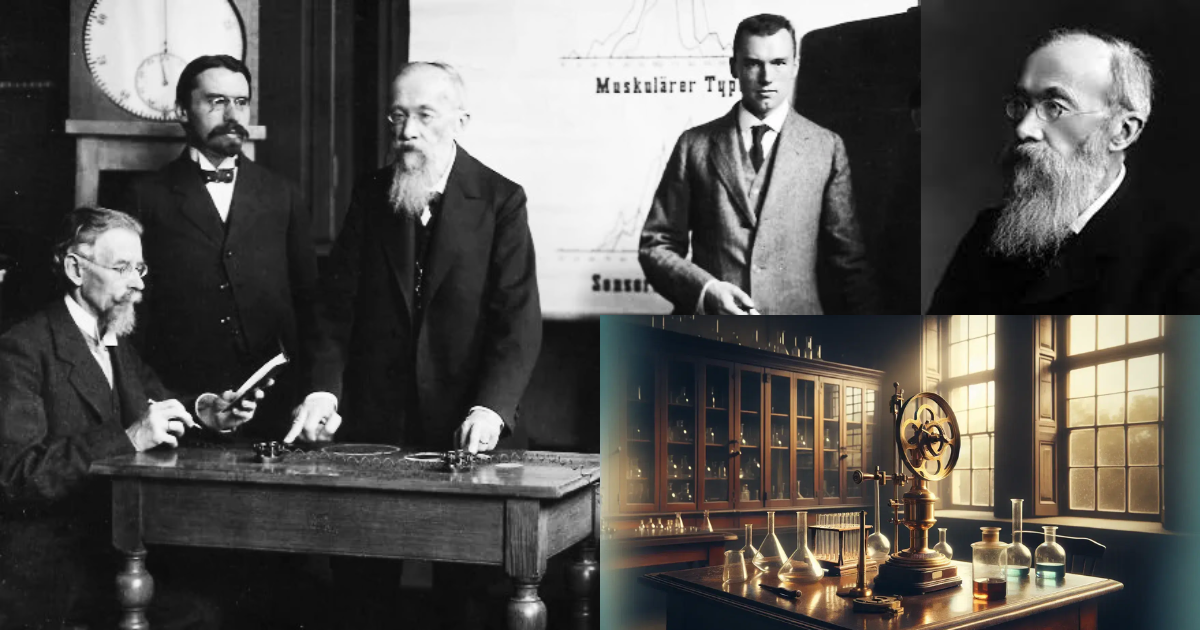Wilhelm Wundt: The scientist who measured the mind
Wilhelm Wundt (1832–1920) may not be as widely recognized as Freud or Jung, but he stands as a pivotal figure in the history of psychology. This German psychologist and philosopher, situated at the crossroads of a scientific revolution, is widely regarded as the founder of scientific psychology. At a time when the study of the human mind was largely the domain of philosophy, Wundt boldly introduced an empirical approach, transforming the field and carving a path toward its recognition as a distinct scientific discipline. His groundbreaking work, particularly the establishment of the first laboratory dedicated to experimental psychology, laid the foundation for modern psychology and continues to influence research methods to this day.
The 19th century was a period of profound scientific transformation. Major advances in physiology, especially Hermann von Helmholtz’s work on nerve conduction velocity, demonstrated that phenomena once reserved for philosophical speculation could be studied quantitatively. Meanwhile, positivism, with its emphasis on observation and measurement, was gaining ground, promoting empirical inquiry and experimentation as primary avenues to knowledge. This intellectual climate, marked by a gradual separation of science from philosophy, created fertile ground for a psychology seeking more rigorous and replicable methods than those offered by traditional philosophical reflection. Influenced by these developments, Wundt aimed to establish an objective psychology rooted in observation and experimentation, positioning it as a legitimate scientific field in its own right.
From healing bodies to studying minds: Wundt’s journey to scientific psychology
Wundt began his academic journey studying medicine at the University of Heidelberg, but his growing fascination with physiology, particularly Helmholtz’s research on nerve impulses, soon took precedence. This orientation towards physiology deeply shaped his vision of psychology. Working alongside eminent scientists, he absorbed their meticulous methods, which prepared him for the monumental task ahead: founding a psychology grounded in empirical methods.
Key Milestones in His Life:
- 1874: Publication of his seminal work, Principles of Physiological Psychology, which laid the groundwork for his scientific approach to psychology.
- 1879: Establishment of the first experimental psychology laboratory at the University of Leipzig, marking the official birth of scientific psychology and a decisive break from philosophy.
- Teaching and Influence: Wundt trained generations of psychologists, including Edward Titchener, who later propagated structuralism, a school of thought directly derived from Wundt’s work. His influence is vast, with an extraordinary output of over 53,000 pages written throughout his career, reflecting his dedication and ambition to shape this new discipline.
Milestones of a mind pioneer: key moments in wundt’s life
At the heart of Wilhelm Wundt’s scientific revolution was experimental introspection. Far from being a mere subjective reflection on one’s thoughts, this was a rigorous, systematic process. Carefully selected and trained participants were exposed to controlled sensory stimuli, precise sounds, vivid colors, varied textures, and asked to describe their conscious experiences with exceptional detail and accuracy. This meticulous approach aimed to identify, isolate, and analyze the fundamental components of conscious experience, akin to how a chemist breaks down a complex substance into its basic elements.
Wundt was convinced that the mind, no matter how intricate, could be understood by deconstructing conscious experience into its simplest elements: sensations, feelings, and mental images. This structuralist approach sought to map the mind by identifying its basic units and their interrelations. The analogy to the natural sciences, particularly chemistry, underscores Wundt’s ambition, to apply the rigorous methods of experimental science to the study of consciousness.
Several experiments exemplify this approach:
- Reaction Time Measurement: Wundt and his colleagues measured individuals’ reaction times to various stimuli. This quantitative method aimed to objectify mental processes by measuring the time required to process sensory information and produce a response. It was a pioneering attempt to quantify the invisible, to measure mental processing time.
- Sensory Analysis: Participants were presented with diverse sensory stimuli, and their detailed descriptions were analyzed. The goal was to determine the basic qualities of these sensations (intensity, duration, quality) and understand how they combined to form more complex perceptions. By isolating these basic elements, Wundt sought a structural understanding of sensory experience.
It is important to note that Wundt’s experimental approach, while groundbreaking for its time, focused on studying “normal” consciousness rather than mental disorders. His Leipzig laboratory was primarily dedicated to investigating perception, sensation, and basic cognitive processes in individuals without signs of mental illness. Psychopathology, the study of mental disorders, was then considered a separate field, primarily within the domains of psychiatry and medicine. While aware of mental illnesses, Wundt regarded their study as belonging to a different, more clinical and observational approach, rather than a quantitative and experimental one. This distinction between experimental psychology (the focus of his research) and clinical psychology (concerned with mental disorders) is crucial to understanding Wundt’s legacy and how psychology subsequently diversified.
From vision to debate: the enduring influence and critique of Wundt’s ideas
Wundt’s impact is undeniable. His laboratory became a hub for aspiring psychologists worldwide, and his experimental methods profoundly shaped the field’s development. Although structuralism, as a dominant school, was relatively short-lived, it laid the groundwork for many subsequent approaches. His influence remains evident in cognitive neuroscience, which employs rigorous experimental methods to explore brain function and cognitive processes.
However, experimental introspection faced strong criticism for its lack of objectivity and poor reproducibility. The inherent subjectivity of participants’ reports made it difficult to compare and generalize results. Schools of thought such as behaviorism, focusing on observable behavior, emerged in response to these limitations. “Psychology is the science of conscious experience,” Wundt asserted. Still, the journey toward objectivity in psychology proved longer and more complex than he had anticipated.
Despite these critiques, Wundt’s legacy as the architect of experimental psychology endures. His rigorous approach, though refined and evolved over time, established the foundation for the scientific methods used in psychological research today.
While Wundt pioneered a new scientific method, the dialogue between psychology and philosophy was never entirely severed; the existential questions that animate the latter continue to shed light on the inquiries of the former.
Wilhelm Wundt: The philosopher
Despite his commitment to a rigorous, experiment-based psychology, Wilhelm Wundt remained deeply rooted in the philosophical tradition. His conception of psychology extended beyond mere measurement, incorporating vital philosophical considerations. His reflections on the will, for instance, reveal this integration. For Wundt, the will was not simply a mental process but an active force, a capacity of the mind to influence the world and assert self-determination, a concept far exceeding mere objective observation. Although not central to his experimental research, this philosophical outlook shaped his broader understanding of the human mind, underscoring the inseparable bond between the scientific and philosophical dimensions of his work.
Wundt’s experimental approach never entirely broke free from its philosophical roots. While experimental introspection aimed at a precise, objective analysis of conscious experience, Wundt also acknowledged the role of feelings and subjective elements. Furthermore, his reflections on the critical role of language in shaping thought and consciousness highlight the persistence of philosophical inquiry. Viewing language not merely as a communication tool but as a constitutive element of experience itself, Wundt demonstrated a profound philosophical concern, a desire to integrate symbolic dimensions into the understanding of the human mind, beyond the strict confines of experimental methodology.
It is essential to recognize that despite his dedication to scientific methods, Wundt never dismissed philosophy. His work on will, emotions, and the importance of language in constructing conscious experience reflects an enduring philosophical reflection, enriched by a rigorous, experimental approach. This synthesis of philosophical and scientific elements defines the originality and complexity of his contribution to psychology.
Wilhelm Wundt may not be as renowned as some of his successors, but his role in the history of psychology is foundational. He has the distinction of transforming psychology into a rigorous scientific discipline by founding the first dedicated laboratory. While his approach faced limitations and criticisms, it laid the cornerstone of modern psychology and continues to inspire researchers today. His legacy, far surpassing the specific methods he employed, rests on a bold vision: the scientific exploration of the human mind.
References
Boring, E. G. (1950). A history of experimental psychology. New York: Appleton-Century-Crofts.
Hergenhahn, B. R. (2011). An introduction to the history of psychology. Belmont, CA : Wadsworth.
Leahey, T. H. (2012). A history of psychology: From antiquity to modernity. Upper Saddle River, NJ : Pearson Education.
Rieber, R. W. (Ed.). (1985). Wilhelm Wundt and the making of a scientific psychology. New York : Plenum Press.
Schultz, D. P., & Schultz, S. E. (2016). A history of modern psychology. Belmont, CA : Cengage Learning.
Wundt, W. (1874). Grundzüge der physiologischen Psychologie (Principles of physiological psychology). Leipzig : Wilhelm Engelmann.

Amine Lahhab
Television Director
Master’s Degree in Directing, École Supérieure de l’Audiovisuel (ESAV), University of Toulouse
Bachelor’s Degree in History, Hassan II University, Casablanca
DEUG in Philosophy, Hassan II University, Casablanca







